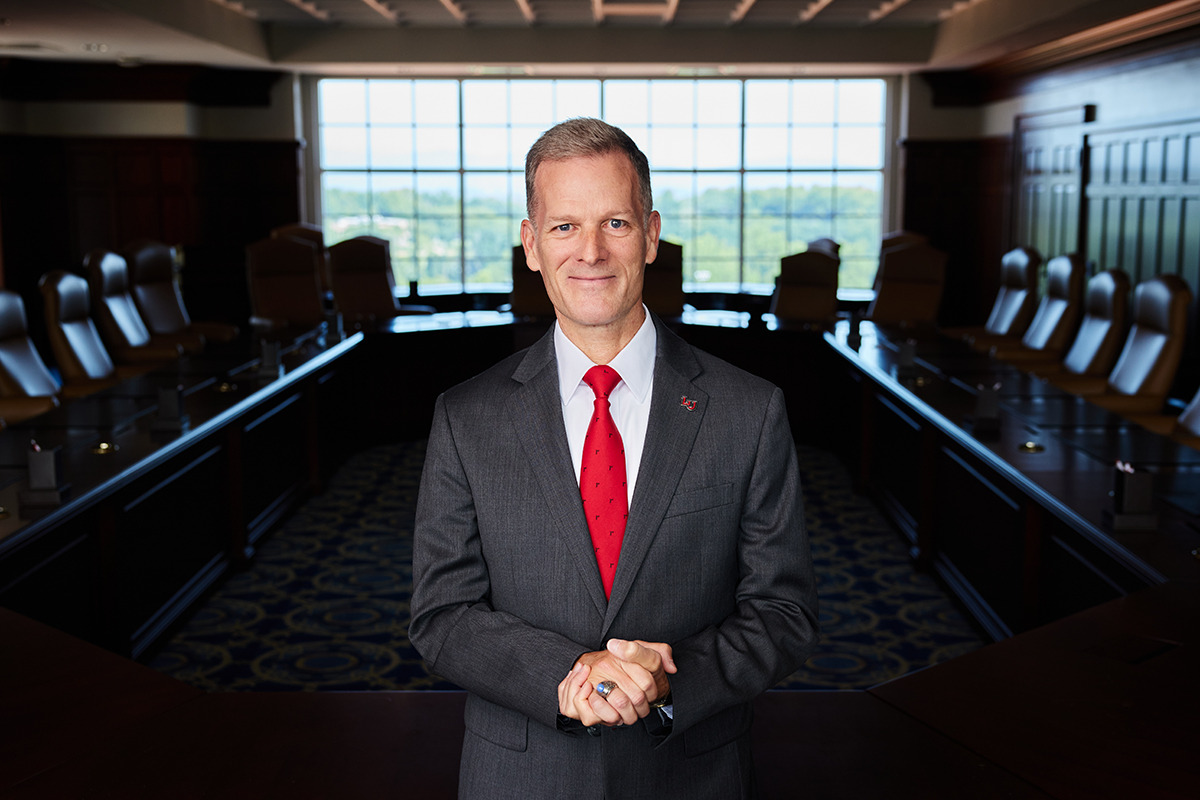Search News Archives
Filter News Articles
Additional Navigation
Leadership, success, and proclaiming Christ in higher education: A chat with Liberty University President Dondi Costin
September 1, 2023 : By Office of Communications & Public Engagement
 It has been two months since Dr. Dondi E. Costin assumed his role as president of Liberty University, and he has already made his vision and presence clear for all to see. Seeking to build upon the work of founder Dr. Jerry Falwell and those after him who have joined God in His work on Liberty Mountain, Costin views his presidency as an opportunity to further the university’s distinct Christian mission while addressing the challenges of operating one of the world’s largest Christian universities head-on. Ever since students returned for the fall semester and campus has gotten back to buzzing, Costin has attended countless events both formally and casually to meet the Liberty community face-to-face.
It has been two months since Dr. Dondi E. Costin assumed his role as president of Liberty University, and he has already made his vision and presence clear for all to see. Seeking to build upon the work of founder Dr. Jerry Falwell and those after him who have joined God in His work on Liberty Mountain, Costin views his presidency as an opportunity to further the university’s distinct Christian mission while addressing the challenges of operating one of the world’s largest Christian universities head-on. Ever since students returned for the fall semester and campus has gotten back to buzzing, Costin has attended countless events both formally and casually to meet the Liberty community face-to-face.
President Costin recently sat down for an extended interview with Ryan Helfenbein, Liberty’s Vice President of Communications & Public Engagement, to discuss his philosophy as a leader, Liberty’s role in the evolving climate of higher education, goals for reaching the current student body’s generation, and the ultimate goal of sending forth Champions for Christ into the world with each coming year.
Maj. Gen. (Ret.) Dondi E. Costin, Ph.D., came to Liberty as a continuation of a lifetime dedicated to service. Most recently, Costin served as president of Charleston Southern University (CSU), preceded by 32 years of commissioned service in the U.S. Air Force, during which he represented the Liberty Baptist Fellowship as an endorsed chaplain. He completed his military career at the Pentagon as Air Force Chief of Chaplains.
[Listen to Costin share his faith journey]
Liberty University’s Strategic Plan
Two months into his time at Liberty, Costin has already begun to work with departments to develop a strategic plan that will address the entire university and the people who form it. In creating this plan, he has consulted faculty and staff at all levels for input based on their own experiences, and he has expressed his excitement for what is to come.
“One of the things that I think any leader should do is recognize that they’re never the smartest person in the room. Yes, they may have good ideas, but their ideas are limited by their fallible or limited scope. My approach has always been, coming into a new place, to legitimately ask the question, ‘Where are we and where should we be going?’ I showed up on July 1. Do I have ideas about where we are? Sure, I have ideas about where we are, but do I know where we are? Not exactly. I know more now 60 days in than I knew at the beginning. The process we’re doing now is simply asking the question of the experts, and the experts are all of us — faculty, staff, students, alumni, and community leaders. Liberty University is a well-oiled machine, staffed with incredibly smart people, passionate people, Christian people who are called by God to do great things, and any leader’s job is to ask, ‘Are we doing everything that we’re doing as well as we can be doing it?’ and ‘Are we doing enough of it?’ The strategic planning process will answer those questions. Where are we now? We’re at Point A, and in four or five months I’ll be able to say what Point B is. No day is the same. We wake up every morning and… we get to do something great for the Lord today, and He’s planting us at Liberty University to do exactly that.”
The Definition of Success
Being successful as a university and as a president, Costin explained, is relative to the specific goals that he has for Liberty. In addition to the academic and logistical accomplishments that all universities strive for, Liberty has the larger purpose of creating and refining Christian leaders who will be successful in their given field and live their lives on Earth for the glory of God.
“In the Christian life and university life, we have to define for (Liberty) what success looks like, and success for us is going to be different than it might be for a secular institution. There are going to be a lot of things that look the same; we count a lot of the same things — how many students do we have, how much revenue comes in, how many classes are offered, how many degree programs, what’s our retention rate, what is the graduation rate. In those respects, we can measure success by what the established standard is. But with Liberty University, and I would argue every distinctively Christian university, we have to do so much more than that because we aren’t just handing people diplomas at the end; we are giving them preparation not just for this life but also preparation for the next life. If somebody comes to Liberty University and they think they’re here just to get a degree, and we let them do the whole four years and graduate having never been confronted with the Gospel — if they’re never confronted with the idea that they have been put on this planet for a purpose that is far bigger than themselves — then we aren’t successfully doing what our university is here to do. It’s our job to equip them and shape them and mold them and push them to do things even bigger than they thought they should do them. Success really comes as a measure against what God wants for you to do and to be.”
Being L.E.A.D.E.R.S. at Liberty
Costin’s philosophical principles about leadership, both for himself and for others at Liberty, is summarized in the acronym L.E.A.D.E.R.S. — Lordship, Environment, Accountability, Development, Execution, Result, and Shepherding.
“I spoke to the faculty (at a faculty Convocation on Aug. 28), and what I mentioned to them is that there’s this phrase that is often used around here: ‘If it’s Christian, it ought to be better.’ And that was from Dr. Falwell. What was he saying? He was saying something brilliant, and he was parroting the Scriptures. Everything you do should be done for the glory of God, and if you’re a Christian, in whatever job you’re doing, settling for mediocrity isn’t OK. So as a university, we should do that. I modified it simply to say this: ‘If it’s Christian, it ought to be Christian.’ If it’s Christian, it ought to be such that we are living our lives following the Lord; we should take every thought captive for Christ. We should not bifurcate, ‘Well, this is my church world, this is my family world, and this is my university world.’ Everywhere you are, you are engaging with men and women, boys and girls, who have been created in the image of God. If you have a leadership responsibility, if you lead one person, you have the same obligation that I have, and that is you have to be the shepherd of the flock God has given you.”
Proclaiming Christ in Higher Education
In a society that seems to have neglected or even outright rejected God, Liberty University remains steadfast in its belief that He is the Creator and Lord over all. Rather than bending or quieting its values in order to match others around the world, Costin said Liberty will continue to boldly share the truth that God has never left and never will. He recounted his time as a military chaplain, when he saw many people who were uncertain about God’s role in the world today, some even scared to mention religion at all.
“A Christian university is going to be more important in the coming decades, not less. Some of our peer institutions have said through the past decade that the culture is going one way… that for us to be able to keep up with the times, we need to lower our standards, we need to pull back from biblical convictions, so that we can keep up with the Joneses or keep up with the times. From the very beginning of time, people have thought they knew better than God. Adam and Eve thought they knew better than God. In all of the book of Judges, or basically all the Old Testament, you look at how everyone did what was right in his own eyes, and Israel has a period of falling away. We’re now in a period of history when humankind has thought we don’t need God, that we know better than God. What Liberty University has to do is say, ‘We are not departing from the faith that was once and for all delivered to the saints. Here we are. We’re not doing this because we’re braggadocious or (prideful); we’re doing this because we understand who God is, who He has called us to be. We are just simply Training Champions for Christ so that they will go out into these various spheres of influence and be a reminder in these pockets that God is still God, and He wants the best for us.”
Why Christian Education Is Worth It
From the beginning of Liberty University, when Dr. Falwell laid out his original vision, giving students an opportunity to earn a Christ-centered education has remained a core objective. Due to inflation, costs have continued to rise for every family and organization. Costin addressed affordability and said receiving a Christian education from a four-year university like Liberty is well worth the investment, allowing students to grow in more than just their academics and financial earnings.
“Yes, we’re a university, which sounds like a building, but a university is not a building. A university is people, and so you have students and their parents who are fighting hard to find the money to pay for a Christian education because it’s worth it. (We) have faculty and staff who are fighting hard to be here when many of them could go elsewhere and make more money, and they’re fighting hard to be here because it’s worth it. People ask, ‘What’s the value of a Christian education?’ It is in the fact that God wants Christians to understand God better. God wants Christians to understand how to be a critical thinker, how to be a problem solver, how to evaluate a text, how to look at data, how to put all that together and advocate for policies and principles and people in ways that are going to be good for society. Is it true that most every student, if you get a college degree, will have lifetime earnings on average that are going to be more than others? Yes, that’s true. But that’s not why you do this. You do it mostly so that you can understand God better and go be a Champion for Christ.”
Reshaping Generation Z
Today’s college students are what Costin calls “digital natives,” people who have grown up with technology an arm’s reach away. With that, he said, comes both good and bad influences on their social dynamics. Noting that his own upbringing and large portion of his career had passed before the Internet even existed, he said as the leader of a university filled with young people who have been shaped by the digital age, it’s worth exploring the likely correlations between increased mental health challenges and decreased religiosity and the warped definition of community developing among members of Generation Z as they interact on “unblemished” social media accounts.
“It’s not the leader’s job to say, ‘I wish everybody was like me. I wish everybody was raised the way I was. I wish everybody thought the way I did.’ The leader’s job is to recognize that these are the people you have, this generation is what it is, and it’s not your job to try to wish your way. Your job as a leader is to bring these folks in, inspire them to do great things, and help them understand that they can actually be involved in a cause that’s bigger than themselves. This generation is looking for meaning and purpose and value and identity. Technology has brought this false notion that you can have friends on certain social media platforms that you’ve never even seen before, and they’ve only seen the curated stuff, the good stuff. Don’t you think they have bad stuff that they’re not showing? Don’t you have bad stuff? Don’t you have difficulty? If the Bible had been Facebook or Twitter or Instagram, it would be all amazing and no mistakes, but that’s not the way the Bible is. The Bible has heroic people making really dumb decisions and having to live with those decisions, and God being there going, ‘Listen, I’m here for you. Just call upon me.’ What Liberty University does extremely well is help people understand the significance, the importance, the purpose, the essential nature of belonging. We do everything in our power with God’s help to force people, in the best of ways, to at least confront the fact that what you think of as community isn’t community. We have a true community here.”
A Training Ground for Champions for Christ
When parents, guardians, or others who have “poured their heart and soul” into young people decide where to send their son or daughter, they are choosing the place where he or she will be experiencing significant life moments and potential change, Costin said. He affirmed that Liberty University will remain a place where students can safely ask questions about God, be encouraged to deepen their faith, and enjoy fellowship with other believers — all of which are not often found at secular schools.
“If you send your child whom you’ve poured into — you’ve told them that the Bible is the Word of God, that the Bible is inerrant, that God loves them with everlasting love, that Jesus Christ is the only way of salvation, that that Creation is true — and then they go off to a secular school, they will have new friends who have not been raised that way, perhaps who have been raised in a completely different way. They are going to have to get themselves up out of bed to go to class and to church with people around them saying, ‘That Jesus stuff, that’s kid stuff. That’s fake stuff. That’s old stuff. You’ve got to get with the times.’ How do you like their chances? How do you like their chances when a Ph.D. who is anti-Christian stands in front of the class as an authority figure and around them are peers who are denigrating the faith of this child that you’ve raised, who for the first time doesn’t have the support structure? Wouldn’t it be so much better, in this very formative period of their life, to send them to an unapologetically Christian school where every faculty member and every staff member is a professing believer in Jesus Christ who understands that He is the only way of salvation and that the world is created by God? They have Convocation twice a week, they have (community) groups, they have professors who love the Lord, who are training them to be Champions of Christ and who aren’t afraid of their questions. If I were a parent today thinking about where I’m going to send my kid to college and I’m going to be paying for it, I like my chances a lot better sending them to Liberty than I do sending them to any secular school I can think of.”


